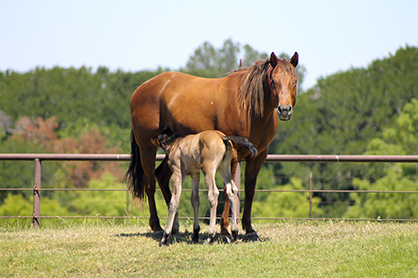Fall Horsekeeping Tips
Kentucky Equine Research
For many horse owners, autumn represents the ideal time to enjoy their horses. While horses thrive on consistency, changes in environment dictate the way horses are managed, especially the young and old. Tweaking of schedules and diets is not uncommon and sometimes necessary for optimal health. Continue reading below for seasonal horse-management tips from Kentucky Equine Research (KER), the world leader in equine nutrition.
Get Ready for Cold Weather.
The cool, refreshing breezes of fall can quickly turn into harsh, frigid gales of winter. Be prepared for winter weather by making a checklist of must-dos, including purchasing hay, repairing barns and run-ins, and sorting your horse’s winter wardrobe. A few suggestions:
- Shelter Provides Warmth to Horses Even in Mild Winters
- Feeding Electrolytes in Winter
- Feeding Horses Leftover Hay
- Buying Hay for Horses
- Color of Horse Hay: What Does It Mean?
Autumn Health Concerns
While fall offers much to be thankful for, including cool temperatures and scenic trails, the season can cause hiccups in horse care, especially in terms of what horses consume. As the days shorten, you can stow the mower, but other problems lurk in pasture and their surroundings. Read on:
- Four Fall Feeding Facts for Horses
- Managing Horses on Declining Pasture
- Acorn Poisoning in Horses
- Fall Fear: Atypical Myopathy in Horses
Old Horses
Special consideration should be given to horses that are beginning to feel the effects of advanced age. Simple changes in care and management will not only help older horses get through another autumn and winter but may also prolong their usefulness as both companions and mounts. Learn more:
- Exercise and the Older Horse
- Muscle Repair in Horses Declines with Age
- Placing Feeders for Older Horses
- Monitor Teeth, Weight, and Diet
Young Horse Management
Properly nourishing weanlings and yearlings lays the foundation for soundness and longevity, regardless of future athletic endeavors. Less obvious factors, including prolonged confinement, may also play a part in performance expectations. Management tips:
- Feeding Underweight Weanlings
- Successful Weaning of Foals: Keep Them Eating
- Confinement Weakens Bones in Horses
- Physitis in Young Horses: Diet Change Often Necessary











